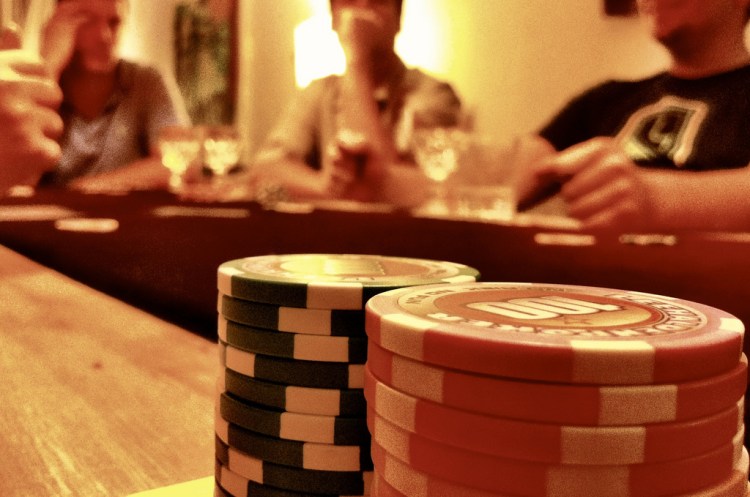You hear a lot of chatter in poker rooms. If you don’t want to be an annoyance at the table, don’t say any of the following.
You Don’t Say These Things at the Poker Table

You Don’t Say These Things at the Poker Table
by Michael Wiesenberg © 2019 Great Bridge Links
You hear a lot of chatter in poker rooms. If you don’t want to be an annoyance at the table, don’t say any of the following.
(Note: Some players want to annoy the others, perhaps thinking that they will have an edge if the others are out to get them rather than playing their best game all the time. Going after one player — even though that player may be a royal pain — is not optimal play.)
Don’t Accuse an Opponent of Not “Gambling”
In almost every game I’ve played in in a public cardroom, someone was sure to say, “What’s a matter, you afraid to gamble?” The guy with a lock on the pot tries to entice suckers into his web. This backfires sometimes, though, because when the situation is reversed, he quite obviously is never willing to take the worst of it. You gotta give action to get action, goes the saying. Don’t try to cajole the players into doing what you won’t do in return.
Related to this I often heard an utterance that went along the lines of, “You got as much gamble as Grandma Grundy [or similar].” A variation on this one is, “You must have a lot of gamble in you, because you never let any of it out.” Tight players who wish to seem like they’re giving a lot of action sometimes accuse others of playing tight, mainly to take the heat off them. This, too, backfires. If you don’t draw attention to tight play, others might not notice it in you; conversely, if you do, they probably will. This sort of saying usually comes from a player who “talks” a good game, but rarely gives any action. Don’t talk action; play action. In other words, let your actions speak for themselves.
Don’t Give Lessons
Over the years I’ve heard many players try to “educate” their opponents. I put “educate” in quotes because what they’re really trying to do is prove their own superiority. For example, in a hold’em game: “You should never have called that raise with two small cards; it was obvious he had a high pair.” In any game: “What were you doing in that pot? Don’t you know that guy never comes in unless he has a monster?” Or, “How could you put all your chips in to draw to a flush? You weren’t even getting 2-to-1 on your money.” There are lots of variations on this theme. They all fall into the category of giving lessons, something a smart poker player should never do. Lots of reasons why. If you teach the players you’ve been beating so easily how to play properly, you may no longer find them so easy to beat. If you embarrass a player after he’s just lost a big pot, he may find it a lot easier to resist getting in the next one, with you. He will reason that if he makes a dumb move, thereby losing a pot, you will laugh at him (or criticize him), and he doesn’t want his feelings hurt again. And, you don’t even want to put the notion into other players’ minds that it’s possible to fold if they don’t already know it. You should love it when they call raises against the other players in situations where they have much the worst of it. Sure, you don’t get the money that time, but you may the next time. Don’t give lessons. Some of the best poker players are guilty of this sin; they’d be better players if they didn’t do it.
Don’t Say You’re Betting Without Looking, Unless You Really Are
On the river card in seven stud: “I bet without looking.” The only time you should say this is when you really didn’t look, and that is before you receive the river card. Unfortunately, too many players sneak a peek, make this pronouncement, and then bet. True, the rules of poker don’t really cover this situation, at least not in public cardrooms. Poker is a game of deception, and many players believe that whatever you can get away with that is technically within the rules is part of that deception. The trouble is, if you do it a lot, people will sometimes see that quick peek, and you’ll get a reputation as a liar, a dishonorable player. That is not a reputation an honorable player wants. There are enough lowlife players with bad reputations without you getting that handle unnecessarily. And if there is any doubt whatsoever that you’re telling the truth in that situation, you won’t be believed the one rare situation where you really do want to bet blind. What should you say? Nothing. Even if you really did bet blind, keep your opponents guessing.








